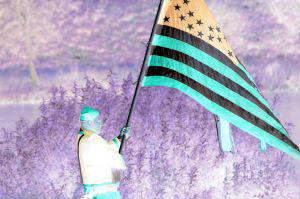Memorial Day post...
 This morning, I heard a radio report on NPR about Williams, Arizona, and a band of high school kids there who play together in the style of a Civil War band. The band's director, in his interview, mentioned a particular battle that he felt highlighted the role of musicians during the war. It was an interesting tale, and it led me to do a little more research on the subject this morning.
This morning, I heard a radio report on NPR about Williams, Arizona, and a band of high school kids there who play together in the style of a Civil War band. The band's director, in his interview, mentioned a particular battle that he felt highlighted the role of musicians during the war. It was an interesting tale, and it led me to do a little more research on the subject this morning.
After reading more about the matter, I decided the underlying message was probably more important than the interview indicated. If you are here in the United States (and my stats indicate that approximately 80% of you are), take a moment to memorialize the young men with horns and drums at the battle of Stones River and the message their story underlines...
On December 30, 1862, Union and Confederate soldiers had encamped near the town of Murfreesboro, Tennessee, near Stones River. In all, more than 80,000 soldiers were there. One day later, a multi-day bloodletting would begin.
Today, the battle is remembered both as an immediate precursor to the Emancipation Proclamation, one of the war's most violent confrontations (a casualty rate over 30%) and a possible turning point in the war. It was a gruesome event featuring a location referred to as the "slaughter pen" that led one participant to later say that Stones River flowed "red with blood."
I want to mention the night before the battle. As was customary, military bands were on hand on both sides. At some point in the night one band began to play. As they completed their tune, a band from the other side took up with a song of their own. "Dixie" was answered by "Yankee Doodle," "Bonnie Blue Flag" led to a rendition of "Hail Columbia." The battle of the bands appeared to be a sneak preview of the real battle that would soon commence.
At some point, however, one of the bands began playing a relatively new tune that resonated with folks from both the north and south--"Home Sweet Home." Instead of eliciting a rebuttal, the bands from the other side joined in on the tune. For those not familiar with "Home Sweet Home," here are some lyrics:
"’Mid pleasures and Palaces though we may roam,
Be it ever so humble there’s no place like home!
A charm from the skies seems to hallow us there,
Which seek through the world, is ne’er met with elsewhere.
Home! Home, sweet sweet Home!
There’s no place like Home! There’s no place like Home!"
The director of the Arizona band painted it as a shared sentiment. So do other sources. There are some that felt some one-upmanship was still involved, but it seems that at some core level the two armies, separated by only a few hundred yards, were expressing solidarity. One account claims that most every soldier joined in and that an emotional chorus of 80,000 shared John Howard Payne's lyrics. At least for awhile, there was an understanding of connectedness.
The order for sleep was eventually given and the strains of the tune was replaced by a silence.
That silence, of course, was broken the very next morning and the battle was underway.
I know that many of us will be thinking of friends, relatives and others who sacrificed in the armed forces today. Some will celebrate past military victories. Others will root for future wins. Some will lament poor military decisions from the past. Thoughts will be with those currently in uniform, regardless of one's position on our current foreign policy.
I'd like to invite others to spend a few minutes thinking about the night of December 30, 1862 and what it tells us about our true instincts toward war and the common ground all people share, regardless of which band plays behind them.
I come from Kansas. Bob Dole heroically stormed an Italian machine gun nest during World War II and Dwight D. Eisenhower's presidential library and boyhood home are just a few hours down the interstate. Harry Truman presided over WWII's end, and it would take me less than an hour to reach a series of Missouri monuments dedicated to his legacy.
I'm not going to walk by the new Robert Dole Center for the study of politics on the University of Kansas campus. I won't be driving down to Abilene to reflect on Ike. I have no plans to cross the state line today. My Memorial Day contemplation will consist of thinking about some cold and scared kids who really didn't seem to want to start killing one another.
